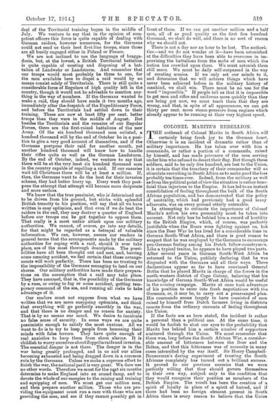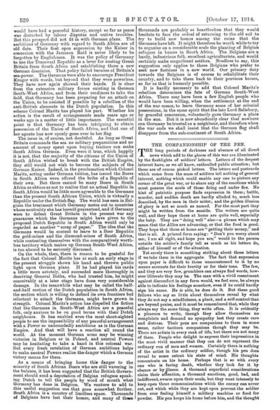COLONEL MARITZ'S REBELLION.
In attempting to estimate the importance of Colonel Maritz's action his own personality must be taken into account. Not only has he behind him a record of hostility to the British Empire, which, of course, was perfectly justifiable when the Boers were fighting against us, but since the Boer War he has lived for a considerable time in German South-West Africa, and there is good reason to suspect that he was employed by the Germans to encourage pro-German feeling among his Dutch fellow-countrymen. Like a typical traitor, he appears to have played two parts. After several years in German South-West Africa he returned to the Union, publicly declaring that he was disgusted with the Germans and all their ways. These declarations appear so far to have convinced General Botha that he placed Maritz in charge of the forces in the north-western district of Cape Colony, believing that his knowledge of German South-West Africa would be useful in the coming campaign. Maritz at once took advantage of his position to enter into fresh negotiations with the Germans, or, it may be, to carry out a prearranged plan. His commando seems largely to have consisted of men raised by himself from Dutch farmers living in districts remote from the ordinary currents of feeling throughout the Union.
If the facts are as here stated, the incident is rather a personal than a political one. At the same time, it would be foolish to shut our eyes to the probability that Maritz has behind him a certain number of supporters scattered through the Union. We must remember that there was, long before the South African War, a consider- able amount of bitterness between the Boer and the Briton, and that this bitterness was of necessity in many cases intensified by the war itself. Sir Henry Campbell- Bannerman's daring experiment of trusting the South Africans completely has turned out a brilliant success. It proved to our previous enemies that we were perfectly willing that they should govern themselves in their own way, subject only to the condition that they would recognize their position as members of the British Empire. The result has been the creation of a, spirit of loyalty in place of a spirit of hatred, and if there had been no foreign element present in South Africa there is every reason to believe that the Union would have had a peaceful history, except so far as peace was disturbed by labour disputes and native troubles.
But this prospect did not fit in with German plans. The ambitions of Germany with regard to South Africa are of old date. Their first open expression by the Kaiser in connexion with the Jameson Raid is never likely to be forgotten by Englishmen. It was the policy of Germany
to use the Transvaal Republic as a lever for ousting Great Britain from South Africa and establishing there a new German dominion. That policy failed because of Britain's
sea-power. The Germans were able to encourage President Kruger with words, but beyond that they were powerless. They have now again showed their hands. It is clear from the extensive military forces existing in German South-West Africa, and from their readiness to take the field, that Germany has been preparing for an attack on the Union, to be assisted if possible by a rebellion of the anti-British elements in the Dutch population. In this scheme Colonel Maritz has played his part. Whether his action is the result of arrangements made years ago or weeks ago is a matter of little importance. The essential point is that Germany has been intriguing to obtain possession of the Union of South Africa, and that one of her agents has now openly gone over to her flag.
The issue is, of course, not doubtful. As long as Great Britain commands the sea no military preparations and no amount of money spent upon buying traitors can make South Africa German. Even were it true, which happily it is not, that the majority of the citizens of the Union of South Africa wished to break with the British Empire, they still would not wish to become the subjects of the German Kaiser. Indeed, in the proclamation which Colonel Maritz, acting under German tuition, has issued the Boers in South Africa were offered the bribe of a Republic of their own. But there cannot be many Boers in South Africa so obtuse as not to realize that an actual Republic in South Africa would be little more agreeable to the Germans than the present South African Union, which is virtually a Republic under the British flag. The world has seen in Bel- gium the treatment which Germany metes out to countries whose neutrality she has herself guaranteed, and if Germany were to defeat Great Britain in the present war any guarantee which the Germans might have given to the proposed Dutch Republic in South Africa would only be regarded as another " scrap of paper." The idea that the Germans would be content to leave to a Boer Republic the gold-mines and the diamond-mines of South Africa, while contenting themselves with the comparatively worth- less territory which makes up German South-West Africa, is too absurd to be seriously discussed.
On the whole, then, there is reason to be grateful for the fact that Colonel Maritz has at such an early stage in the present struggle shown his hand and thrown public light upon German plans. If he had played his cards a little more astutely, and succeeded more thoroughly in deceiving General Botha, who had trusted him, he might conceivably at a later stage have done very considerable damage. In the meanwhile what may be called the half- and-half section of the Dutch population in South Africa, the section which is willing to defend its own frontiers but reluctant to attack the Germans, might have grown in strength. Colonel Maritz's action has dispelled the fiction that the Germans in South-West Africa are a peaceful folk, only anxious to be on good terms with their Dutch neighbours. It has enabled even the most short-sighted people to see the impossibility of any peaceful arrangement with a Power so unboundedly ambitious as is the German Empire. And that will have a reaction all round the world. At the moment German arms may be winning victories in Belgium or in Poland, and neutral Powers may be hesitating to take a hand in this colossal war. But every fresh revelation of German ambitions helps to make neutral Powers realize the danger which a German victory means for them.
Asa means of bringing home this danger to the minority of South African Boers who are still wavering in the balance, it has been suggested that the British Govern- ment should send a deputation of Belgian refugees speak- ing Dutch to tell the people by word of mouth what Germany has done in Belgium. We venture to add to this useful suggestion one that goes somewhat further. South Africa is a country of limitless space. Thousands of Belgians have lost their homes, and many of these thousands are probably so heartbroken that they would hesitate to face the ordeal of returning to the old soil to try to build new homes among the ruins that the Germans have left. It might therefore be worth while to try to organize on a considerable scale the planting of Belgian refugees in homes in South Africa. The Belgians are a hardy, industrious folk, excellent agriculturists, and would certainly make magnificent settlers. Needless to say, this suggestion only applies to those Belgians who prefer to seek new fortunes in a new world. Our primary duty towards the Belgians is of course to rehabilitate their country, and to take them back to their previous homes, so far as that is humanly possible.
It is hardly necessary to add that Colonel Maritz's rebellion determines the fate of German South-West Africa. There may have been a few English people who would have been willing, when the settlement at the end of the war comes, to leave Germany some of her colonial possessions, in the same spirit that the late Lord Salisbury, by graceful concession, voluntarily gave Germany a place in the sun. But it is now abundantly clear that nowhere can Germany be trusted as a neighbour, and therefore when the war ends we shall insist that the German flag shall disappear from the sub-continent of South Africa.



































 Previous page
Previous page